Featured
Mix-up over CSU letters on Tinubu as Supreme Court begins sitting on Atiku, Obi’s appeal
Published
9 months agoon
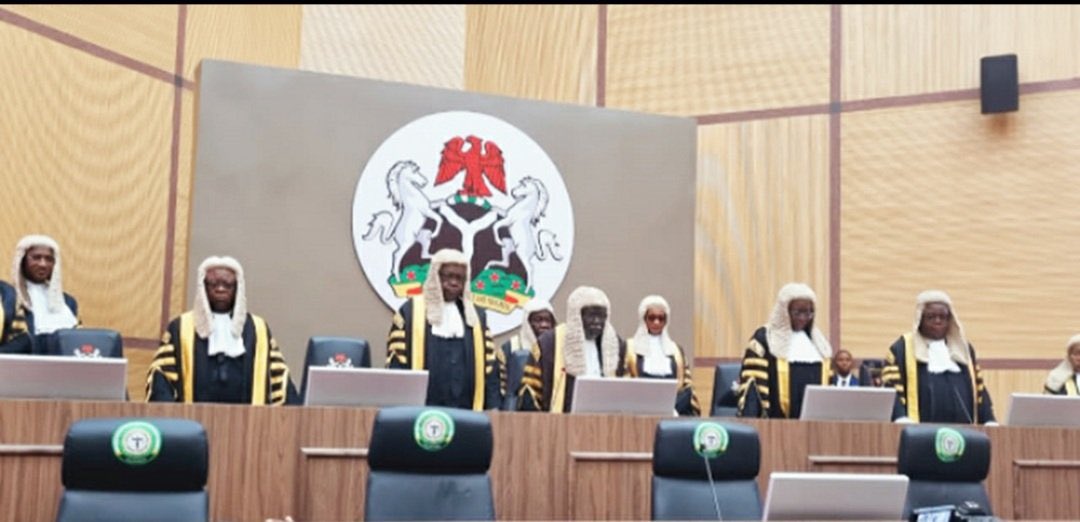
There was a seeming mix-up at the Supreme Court over conflicting reports from the Chicago State University on the education document of President Bola Tinubu being submitted as the court begins hearing on the appeal filed by former Vice President Atiku Abubakar of the Peoples Democratic Party (PDP) and Peter Obi of the Labour Party (LP) on Monday.
The Judges acknowledged that there are two conflicting letters from the Chicago State University, one authenticating Tinubu’s certificate and the other discrediting it.
Justice Inyang Okoro, seeking clarification from Chris Uche, counsel to Atiku Abubakar, on whether the Supreme Court should rely on the constitution or the Electoral Act, asserted: “criminal matters have to be proved beyond reasonable doubt. But in this case, there are two conflicting letters from the CSU – one authenticating the president’s certificate and another discrediting it. “Which do we rely on?”
Chris Uche SAN, Counsel to Atiku Abubakar, addressing the court on the Chicago State University results, had emphasised that the content of the CSU certificate, is a weighty one, grave and constitutional, stating that the Supreme Court should admit as fresh evidence.

Mix-up over CSU letters on Tinubu as Supreme Court begins sitting on Atiku, Obi’s appeal
Uche argued that “the court has a duty to take a look at the certificate and reach a decision by avoiding the issue of technicality.”
Justice Inyang Okoro enquired “if the Supreme Court should rely on the Electoral Act or the Constitution.”
And Uche responded that “the issue is a constitutional one that the court should look into.”
Justice Emmanuel Agim enquired from Uche the nature of Atiku’s fresh documents that he seeks to tender before the court; also, if the testimony by the CSU Registrar was conducted in a court.
Justice Okoro also sought explanation from Uche why he wants the court to ignore constitutional provisions and accept the fresh evidence.
Uche noted that section 233 of the constitution gives the court the power to entertain whether a person was properly elected.
Wole Olanikpekun SAN, counsel to President Bola Tinubu, responding to Uche, asserted that “the question of 180 days is clear,” questioning “where the Supreme Court would compartmentalize Atiku’s fresh evidence.
READ ALSO: Buhari congratulates Gowon on 89th birthday
Olanipekun argued that “it as an application in wonderland and ought to be dismissed as it lacks merit.”
The President’s counsel maintained that “the court is bound by law, and the law should be interpreted as it is, and not how it ought to be.”
Uche, responding, insisted made reference to the CSU proceedings, noting that “there is a slight distinction between proceedings in the US and the UK.”
According to Uche, “In the US, that is how court proceedings are done.
“Mr Tinubu was represented by a US lawyer, but he did not object to the proceedings being held in Atiku’s lawyer’s law office.”
Uche maintained that “depositions are more effective than letters from the CSU authorities regarding the authenticity of Mr Tinubu’s academic records.”
At this juncture, Justice Okoro affirmed that criminal matters have to be proved beyond reasonable doubt. He noted: “But in this case, there are two conflicting letters from the CSU – one authenticating the president’s certificate and another discrediting it… which one should the court rely on?”
Olanikpekun argued that “fresh evidence is not admissible at this point” of the proceedings on the presidential election petitions tribunal which is now at the appeal stage.
According to Olanipekun, “the CSU depositions are dormant until the deponent comes to court and testify. INEC should have been a party at the deposition proceedings in the US.”
Olanipekun also contested that “the question of 180 days is clear. It is sacrosanct. It cannot be shifted. Therefore, Atiku cannot seek to tender fresh evidence at the Supreme Court.”
Counsel for the APC, Akin Olujinmi SAN, argued that the application lacks merit, saying “it is misconceived” urging the court to dismiss it.
Olujinmi maintianed that the Atiku cannot smuggle a document into the Supreme Court without first tendering the same at the trial court.
according to him, “the burden is on Atiku to prove why the fresh evidence should be admitted by the Supreme Court.”
Uche, however, insisted that “the CSU depositions can be used in the Nigerian court.”
The seven justices of the Supreme Court panel hearing that the presidential appeal include Justice Inyang Okoro, chairman of the panel, Justice Helen Ogunwumiju, Justice Ibrahim Saulawa, Justice Adamu Jauro, Justice Tijani Abubakar, Justice Emmanuel Agim and Justice Lawal Garba.
You may like


Obi calls for full support for Dangote refinery
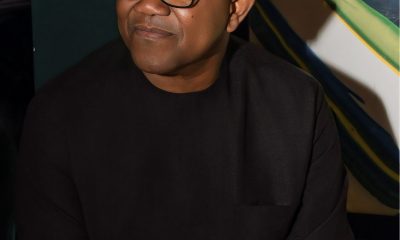

Obi slams APC govt. over unprecedented GDP retrogression
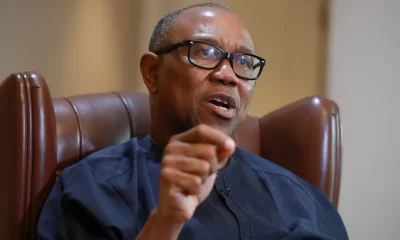

Ignore fake “giveaway” offers in my name, Peter Obi warns Nigerians
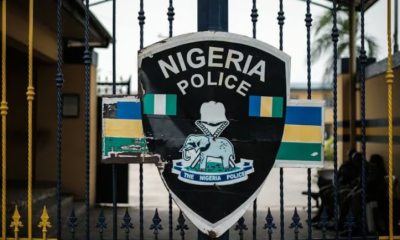

Police thwart attempt by hoodlums to destroy Warri INEC office
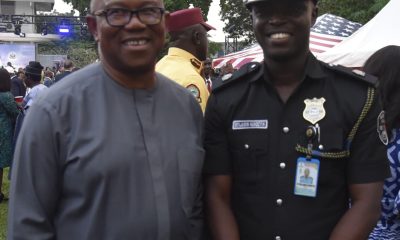

Lagos Police PRO celebrates meeting Peter Obi


FCT Area Councils tenure ends in 2026 – Prof. Yakubu
Trending

 Comments and Issues2 days ago
Comments and Issues2 days agoAs Ariwoola takes the judiciary to the top of the grease pole

 Business6 days ago
Business6 days agoNMDPRA Chief faces backlash over comment on Dangote Refinery

 Business1 week ago
Business1 week agoGlobal cyber outage disrupts flights, Banks, telecoms, Media

 Business1 week ago
Business1 week agoKPMG criticizes FG’s 50% windfall tax, foresees legal disputes

 Business5 days ago
Business5 days agoZenith Bank retains position as Nigeria’s Tier-1 capital leader

 Comments and Issues5 days ago
Comments and Issues5 days agoOnanuga and the Surprise from Joe Igbokwe

 Education7 days ago
Education7 days agoJAMB reacts to allege age limit by ministry of education

 News7 days ago
News7 days agoPhilip Shaibu officially joins APC, dumps PDP




